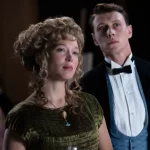And The Tame Film About Her, by Dayne Linford
The Outrageous Sophie Tucker is a fairly by-the-numbers, early-20th-century-celebrity/Hollywood documentary revolving around the extraordinary career and personage of a superstar now largely forgotten, Sophie Tucker. Born in the late 19th century as her family traveled from Russia to the United States, and raised in Hartford, Connecticut’s Jewish community, Tucker’s life was a truly incredible journey from rags to riches, from a social cast off to one of the great stars of the 20th century. William Gazecki’s film is a biographical piece following her life and career from start to finish, which, unfortunately, achieves very little of the vibrancy or character that made Tucker so beloved and so notorious.
As a film, Outrageous falls into all the predictable old Hollywood documentary traps, playing up the glamour and the larger than life characteristics of the men and women therein, but also largely missing the human element so badly needed in these stories. Much time is spent on her technique and her business acumen, which are definitely interesting aspects of her as a person, especially regarding her undeniable skill as a vocalist. However, her Hollywood career is the be-all, end-all of the documentary’s focus, with frustratingly little time spent on the truly fascinating aspects of her character.
As a documentary, Outrageous leaves a great deal to be desired, plodding forward numbingly from event to event with little sense of the character of the times or Sophie’s unique position inside it. It’s unavoidable to compare the work here to Ken Burns, considering how closely it overlaps many of his films, most notably the astounding ten part series Jazz. Outrageous works very hard to not be another derivative Burns-esque piece, instead creating something disjointed and distracting in its attempts to be visually “daring”, which attempts mostly consist of truly awful colorization and embarrassing animations of Tucker in her old photographs, digital manipulation to make her “dance” in an awkward, stilted, painfully terrible fashion. Personally, I’d rather go back to the slow pan over old photos, as much as it apes the master, if I never have to see something so bad ever again. Even with this visual travesty, the ultimate loss in comparison to Burns’ historical pieces is that historical perspective – Jazz is as much about the world surrounding the musicians as it is about the musicians, and it should be. No man, or woman, is an island, and to treat Sophie Tucker absent her historical circumstances is to rob her of what made her unique and what shaped her both as a person and as a star.
In fact, Tucker was as much outside of her time as a part of it. When, long before success and entertainment money came pouring in, she found herself in a miserable marriage with a child, her solution, in 1906, was to leave the child behind and move to New York, determined to pursue her career. What happened to the sister who raised Tucker’s child? The film forgets her as soon as she’s mentioned. Her boy, Albert, does rejoin her later in life, in an ultimately tragic relationship which, when it bothers to detail it at all, the documentary touches on very little, favoring her perspective overwhelmingly. That’s one of the major problems with this piece – it is pure hagiography, with all of Tucker’s selfishness, brashness, boldness, and presumptuousness, in short, the aspects of her character that render her human, vibrant, fallible, and fascinating, treated as delightful quirks. She was very quirky, but she was also fully human. Largely through slight detail and a fixation on pizazz, it ultimately portrays Tucker as a caricature, a shadow of her performative self, which was only an enlarged shadow of her actual self.
Other fascinating details are treated glancingly, such as her many marriages and her tendency later in life to associate primarily with women, including one relationship with a Chinese doctor that was very intimate, probably sapphic. These details are what fleshes a figure out, gives her a sense of depth and character, in addition to her comic persona and her stardom. Instead, the film is an endless series of various celebrities talking Tucker up, run through like a who’s who of “people who knew Sophie Tucker but have very little interesting things to say about her.” Additionally, a good deal of the interviews seems to have been gathered through the efforts of Susan and Lloyd Ecker, proclaimed experts in all things Tucker whose primary interviews provide the backbone of Tucker’s life throughout the film. The celebrity interviews vary greatly in quality, both visually and simply in terms of medium and age, all seen through the dim haze of the Ecker’s hagiographic tendencies. In fact, this film is more the Eckers’ than it ever was Gazecki’s, to the point where I was convinced by its end that they’d literally set up a camera to sit in front of and film themselves talking about Tucker, as opposed to any actual interview. This is most uncomfortable at the end of the film, when Lloyd Ecker, relating his second-hand knowledge of Tucker’s death, actually loses his composure over this celebrity figure that, while he’s developed an obsession over her plethora of scrapbooks, he did not actually know. His only relationship with this figure is that of distant, star-eyed, admiring observer, with no intimacy or insight. That is, unfortunately, the single tone of the film, as well – distant, admiring, by the numbers, and completely devoid of character.

























